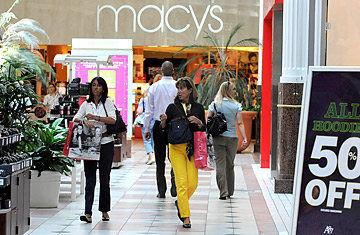
Shoppers at the Pentagon City mall in Arlington, Va.
Predicting how fast a person will be jogging two years hence is tricky, especially when that person is currently flat on his back in a hospital's intensive-care unit.
Nonetheless, Wall Street prognosticators are expected to have at least two years of growth estimates for the economy; securities analysts must also work up two years of earnings estimates for the companies they follow. That's never an easy task, even for a single company, but massive stimulus spending is making the job even tougher this year.
"We typically have some sort of stimulus coming out of a recession," says Maury Harris, chief U.S. economist at UBS, who has yet to finalize his 2011 economic estimates. "What makes it harder than usual is that the stimulus was so much larger than usual."
Much of the debate about how well the economy will do post-stimulus has to do with the health of the U.S. consumer. Some economists believe that consumers, after not spending much in 2009 and 2010, will open their wallets widely in 2011 — and all that pent-up demand will give a big boost to the economy. Others believe that two years of saving won't be enough to cure a decade or more of overspending. And with the consumer still focused on paying down debt, economic growth will be slow at best.
But it isn't just the end of the stimulus that makes 2011 a tough year to call. It will also be the year that all the Bush tax cuts expire. And Harris thinks that if a health-care overall gets passed, that could have significant unforeseen effects on the economy as well. S&P's chief economist, David Wyss, says he thinks most economists are tackling the tricky problem of predicting what will happen in 2011 by doing what they always do: predict the economy will do about average. The problem is that what economists have come to believe is average growth for the U.S. economy in recent years has been falling. The Congressional Budget Office recently said it expects that the U.S. economy will grow on average about 2.2% a year. That's down from a trend expectation of about 3% just a few years ago. "The economy will feel better in 2011," says Wyss. "But that doesn't mean it will feel good."
In general, the projection for late 2010 and 2011, when much of the stimulus spending will have run out, is that the economy will continue to grow but at a rate slower than past recoveries. A recent poll of economists by the newsletter Blue Chip Economic Indicators found that on average, economists expect the economy to expand 2.7% in the fourth quarter of 2010. That's faster than the economy is growing today, but not what you would expect in good times. "The rule is that the deeper the recession, the more robust the rebound," says Blue Chip editor Randy Moore. "But that's not what people are predicting this time. Absent the stimulus, there is still a worry that there is not much demand out there."
Stock-market analysts, who are usually wildly bullish on far-off earnings projections, seem to have the same tentative take on the post-stimulus economy. According to Thomson Reuters, analysts believe that on average, companies in the Standard & Poor's 500 will earn 22% more in 2011 than they will next year. That's a larger-than-average jump for corporate profits. But it will be down from the 25% jump analysts are expecting for 2010, when the stimulus money will still be pumping into the economy. And it is far below other rebounds. In 2003, for instance, corporate profits rose 77%.
"As government spending winds down, we should start getting stronger growth from other parts of the economy," says S&P's Wyss. "But our rate of growth is still probably going to slow because of the drop after the stimulus." And of course, there's that lingering anxiety over what happens if the stimulus ends and the economy is too weak to generate growth on its own.
To be sure, we have a long way to go until the stimulus is finished. The government has spent just $100 billion of the $787 billion that Congress approved in stimulus spending in February. Much of the rest of the money is due to be spent in 2010. As of now, the stimulus spending looks to be having a positive affect on the economy. If that continues, 2011 could be strong as well. If the stimulus affect peters out — or worse, causes hyper-inflation, as some worry — 2011 could be a year when economists and analysts eat a big slice of humble pie.
